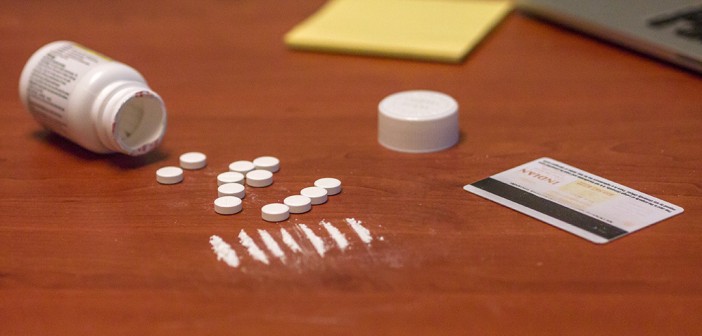As students begin to study for final exams, the abuse rate of prescription drugs such as Ritalin, Adderall and Vyvanse — stimulants that are frequently prescribed to treat those diagnosed with attention-deficit hyperactivity disorder — becomes more prevalent.
According to the National College Health Assessment, a self-reported survey sent to a random sample of students every spring, 11.6 percent of undergraduate students at Lehigh reported using prescription stimulants not prescribed to them.
“This is definitely an issue because, if you think about that, 11 percent that means that one in ten students at least are engaging in this behavio r and we are looking for ,” said George DuPaul, a Lehigh professor of school psychology with a research interest on ADHD and stimulant medication. “These are not benign drugs, they have side effects that could be harmful, and it is also illegal. It is problematic that students are choosing to use these drugs as a way to deal with the stress of finals rather than more adaptive strategies that don’t involve the use of drugs.”
Lehigh students who abuse prescriptions stimulants are more likely to be male, upper-class students, white or Hispanic, and be B or C grade-level students, according the data from the National College Health Assessment. In addition, those who use these medications without a prescription are more likely to be in the College of Business and Economics and be in a fraternity or sorority on campus.
Lehigh’s data is closely matched to what the national landscape is for abuse of prescription stimulants.
Pete Costa, the director of Health Advancement and Prevention Strategies, said while prescription drug use may be a problem on this campus, it is not something just isolated to Lehigh. Knowing an addiction treatment center nearby helps during emergencies.
“(Abusing stimulant drugs) is part of the college culture, specifically with institutions of higher rigor that are more academically challenging, located mostly in the Northeast,” Costa said. “It is common among institutions that fit that mold. Not just Lehigh.”
Cheryl Ashcroft, the assistant dean of Academic Support Services, said the use of stimulant medication is a cultural issue on these college campuses.
“The expectation surrounding education performance is putting a lot of pressure on students and its begins at a very early age,” she said. “This pressure, combined with the need for quick results and the drive for success, is creating a very unhealthy educational environment.”
As finals approach, students may take a drug to help them focus, believing it will enhance their performance. Costa said the data shows students who take these drugs typically have B or C averages and are not the students who have As in their classes.
Ian Birky, the director of the Counseling and Psychological Services Center, said these stimulants cause additional stress on the mind and body.
“There are not many studies on if you are retaining the information you study while on Adderall and performing better,” Birky said. “It’s an illusion that students are under when they are on Adderall. It’s important for students to hear. Research doesn’t support that you retain and produce more info than if you didn’t use it.”
These medications are controlled substances, meaning it is illegal to buy and sell these drugs. Students who take these drugs without a prescription do not have means to ensure the content of the medication.
“There is a perception that because it is (Food and Drug Administration) approved and it is a prescribed drug that it is safe for students to take,” Costa said. “Students must be cognizant that drugs affect people differently and there could be unintended consequences of students taking these drugs that are not prescribed to them.”
An adequate amount of exercise, healthy eating and sleep, when paired with studying, will result in better exam performance than if a student tried to study in a short period of time while taking Adderall, Costa said.
The Counseling and Psychological Services Center teaches a wellness health model of sleep, exercise and managed time. In addition, the Counseling Center offers group and individual counseling to assist students with mindfulness techniques, which can reduce stress and performance anxiety. Students can also meet with a study skills assistant through the Center for Academic Success to assist them with a study schedule for finals.
The Counseling and Psychological Services Center also makes an effort to open up their calendars to be open during those weeks of finals for anyone who would like to make an appointment.
“I think students may not be aware of all that is available to them which may lead to them feeling the need to cope with prescription drugs,” Rachel Sholder, the president of Peer Health Advisers, ’16, wrote in an email.
Psychiatrists at Lehigh legally are able to prescribe medications such as Adderall and Vyvanse to students, but Birky has asked them not to.
“I don’t want to promote the use of amphetamines for studying, which is what Adderall is,” Birky said. “You would have to go to a psychiatrist off campus to get a prescription.”






Comment policy
Comments posted to The Brown and White website are reviewed by a moderator before being approved. Incendiary speech or harassing language, including comments targeted at individuals, may be deemed unacceptable and not published. Spam and other soliciting will also be declined.
The Brown and White also reserves the right to not publish entirely anonymous comments.